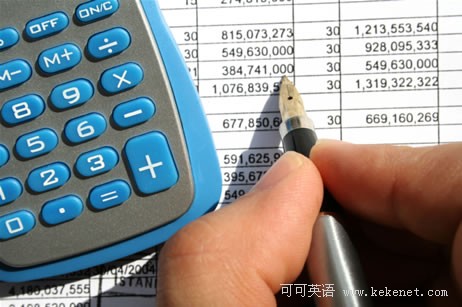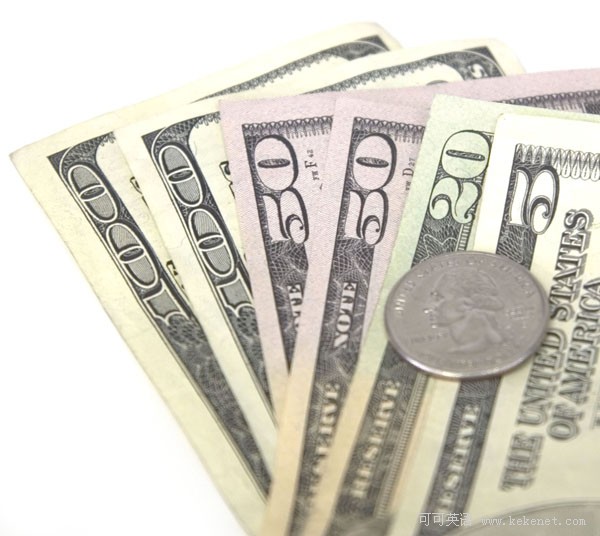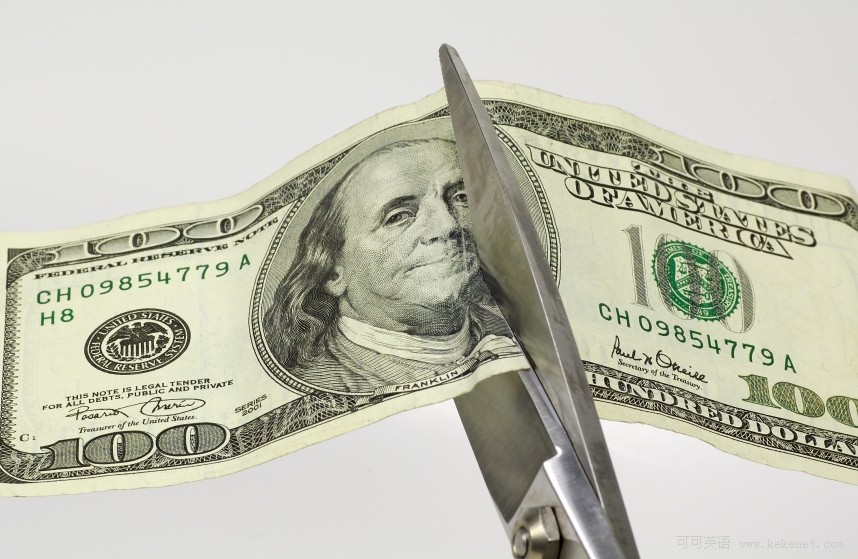(单词翻译:单击)
草拟一个花钱预算

Step One: Write a Financial Wish List
Start big. At the top of your list of money goals should be an emergency fund, says financial coach Judy Lawrence, author of The Budget Kit. "If something happens to you, your spouse, children, computer, or car," says Lawrence, "you'll need something to fall back on to avoid going into debt." Aim to save the equivalent of at least three months of your income. Next, list your big-ticket dreams — to get out of debt, remodel the kitchen, pay for the kids' education, travel to Europe. Also write down personal and household needs (New interview suit? Water heater?) and wants (Kitchen cabinets? Digital camera? Satellite TV?) that you'd like to purchase in the next six months. Finally, note small money goals, such as eating out or getting a manicure once a month. Next to each goal, estimate the dollar amount you'll need to accomplish it.
草拟一个花钱预算
第一栏写上应急款数,譬如你的车子坏了,生病了等等,接着数数花钱的大项:想想则那样能够还清自己的房贷,给厨房改装一下,学费,去欧洲旅游,还有一些自己想做的事情。最后,写下生活中的小数目花费,例如外出就餐,每月秀修一次指甲,然后把所有这些数目加起来。
拟一个存款数额

Step Two: Figure Out How Much to Save
Money guru David Bach, author of Smart Women Finish Rich and The Automatic Millionaire, suggests paying yourself first. Put 10 percent of your monthly gross income into vehicles such as a general savings account (where you can grow your three-month emergency fund and the money you'll put toward financial goals) or a retirement account. Do this and you'll be way ahead of the curve: In the first half of 2006, the national monthly savings rate was negative .45 percent. Which means a person earning a monthly income of $1,500 not only spent her entire salary, but also an additional $6.75 on top of what she made — without saving a dime.
拟一个存款数额
专家建议每月把工资的10%存入定期。
记账

Step Three: Track Your Spending
"You can do a better job of keeping some of your money once you find where it's going," says Bach. So give yourself a full-on reality check. Starting today, stash a small notebook and a pencil in your purse to keep track of every single daily expense, from Monday's $2 coffee to the $50 you spent for groceries on Saturday. Tracking spending for at least one week, say Bach and Lawrence, will give you a rough idea of your money habits — as well as incentive to start changing them. Three pointers: 1. Count the small stuff: $0.95 candy bars, $2 for your son's lunch money. 2. Write down the exact number to the cent or round up to the next whole number or in $0.25 increments. (Don't round down!) 3. Guess. If you forget to record, say, how much you paid for gas yesterday, at least jot down an estimate.
记账
记账是一个好习惯,你可以通过记账知道自己的钱主要花在哪些方面,从现在开始,准备一个小账本和笔,每天记账,包括2 美元的咖啡,50美元的购物账单。
将花费归8类

Step Four: Find Out Where Your Money's Going
Go to Where Does Your Money Really Go? to print out a worksheet that will help you tally your monthly spending in the following eight categories: Housing, Transportation, Insurance, Food, Personal Care, Medical, Children, and Miscellaneous. Or just write these categories at the top of a blank piece of paper, leaving room under each to list your expenses. Create subcategories for each: cosmetics and clothing for Personal Care, groceries and restaurant meals under Food, parking and gas under Transportation. Refer to your daily spending notes from step three, as well as recent credit card and bank statements, for a complete view of your expenses. List each expense under its appropriate category. Then, tally the expenses in each category. Note: If you've only tracked your spending for a week, don't forget to multiply all of the everyday expenses by four for a more accurate whole-month total.
将自己的花费归为8类
粗略地将你每个月的花费归为8类:住房,交通,保险,吃饭,人际,医疗,小孩以及其他,并将每一类的花费写在相应类别下。
减少浪费的钱

Step Five: Identify Wasted Money
As you survey your spending patterns, Lawrence predicts that more than a few expenses will make you ask, "Did I really need this?" Occasional coffees, bottled water, and unread newspapers make up what Bach calls your "latte factor." Assess the small ways you're throwing away cash on little things — and make that the first place you look for money to kick-start your "spend less, save more" financial plan.
减少浪费的钱
花费每一笔钱的时候,首先问问自己:“这个我真的非买不可么?”
开源节流

Step Six: Take Back Your Money
Weigh the "latte factor" expenses against the goals on your wish list. Chances are you'd gladly give up overdue movie-rental fees if it meant taking that family vacation you've been dreaming about. Start by cutting in half the everyday expenses you can't bear to eliminate altogether. Just by halving a two-bucks-a-day soda habit, you could save as much as $365 this year! Bach also recommends lowering your fixed overhead — say, downgrading from a deluxe $80 cable plan to a standard $19.95. In each category, next to the actual amount you spent this month, write a goal amount that reflects any projected cutbacks (say, $28 a month on coffee instead of $56) to guide you next month. These small cutbacks will yield big rewards — a patio set, a new kitchen, college tuition, you name it. And when you look at it that way, it makes taking out pizza once a week instead of twice seem like no sacrifice at all.
开源节流
省下不必要的开支,例如,与一场度假比起来,看电影就显得那么微不足道了。
(可可英语版权所有,未经允许请勿转载)


